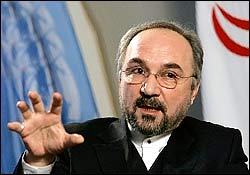The Iranian ambassador to the United Nations says a draft UN treaty to regulate the multibillion-dollar international arms trade contains ‘legal shortcomings.’
The Iranian ambassador to the United Nations says a draft UN treaty to regulate the multibillion-dollar international arms trade contains ‘legal shortcomings.’
Mohammad Khazaei said in an address to the final UN conference on the Arms Trade Treaty (ATT) in New York on Thursday that despite efforts by Iran to rectify various legal flaws in the draft treaty within the framework of serious and constructive negotiations, the preparation of the final draft had been ‘politically motivated’ and the draft was ‘biased.’
The Iranian envoy stated that confrontation with acts of aggression was the main objective of the UN, but the current draft ignored the demand of many countries to prohibit the transfer of arms to aggressors.
Khazaei said the Islamic Republic had been a victim of foreign aggression, adding that Iran’s main question was how human suffering could be reduced while turning a blind eye to the issue of providing arms to aggressors.
Certain paragraphs of the draft have been prepared in favor of a number of particular states, he stated.
Khazaei further expressed regret that efforts to approve a ‘balanced and non-discriminatory’ agreement had been ignored during the UN conference.
Some 2,000 representatives of governments, international and regional organizations and civil societies had gathered at the UN headquarters in New York City to hammer out the details of the agreement, which was seen as the most important initiative ever about regulation of conventional arms within the UN.
If passed, the treaty would have applied to all conventional arms within the categories of battle tanks, armored combat vehicles, large-caliber artillery systems, combat aircraft, attack helicopters, warships, missiles and missile launchers, and small arms and light weapons, according to the draft text.
According to the UN Office for Disarmament Affairs, violence kills more than half a million people each year, including 66,000 women and girls. In addition, about 800 humanitarian workers were killed and nearly 700 injured in armed attacks across the world between 2000 and 2010.
Meanwhile, the Control Arms Coalition, which represents about 100 organizations that have campaigned for a strong arms treaty, stated on Thursday that the UN General Assembly might vote on the treaty on Tuesday. Australian Ambassador to the UN Peter Woolcott, who chairs the negotiations, will report to the UN on the treaty.